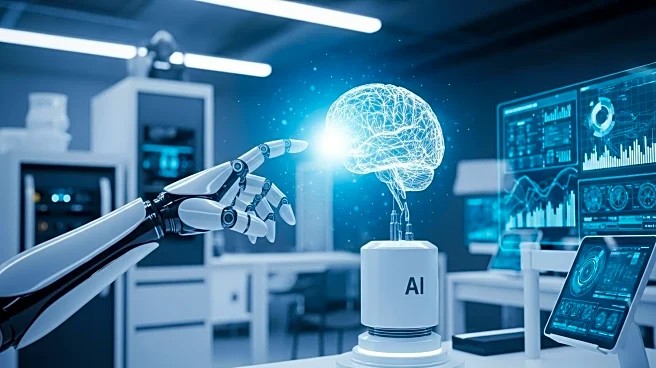What's Happening?
China is aggressively expanding its artificial intelligence (AI) capabilities across various sectors, as outlined in a recent report. The Chinese State Council has unveiled a ten-year plan, known as 'AI+', aiming to integrate AI into every aspect of the country's economy by 2035. This initiative is seen as a key growth engine for China's economic development, similar to the transformative impact of the internet. The plan includes significant investments, such as an $8.4 billion AI investment fund to support practical startups. Chinese tech firms, like DeepSeek, are already implementing AI in diverse areas, including manufacturing, meteorology, and autonomous driving. The city of Xiong’an, designed as a 'city of the future,' exemplifies this integration, with AI being used in agricultural planning and local government operations.
Why It's Important?
China's strategic focus on AI development poses a significant challenge to U.S. economic competitiveness. While the U.S. has invested heavily in AI, the Chinese approach emphasizes practical applications, potentially giving them an edge in real-world implementations. This could impact various U.S. industries, as China may achieve technological advancements that enhance its global economic influence. The U.S. government and tech companies face pressure to accelerate AI development to maintain their competitive position. The outcome of this AI race could influence global economic dynamics, with potential shifts in technological leadership and market dominance.
What's Next?
The U.S. may need to reassess its AI strategies to counter China's advancements. This could involve increased government support for AI research and development, as well as fostering innovation in practical AI applications. The U.S. tech industry might also explore collaborations and partnerships to enhance AI capabilities. Additionally, policymakers could consider regulatory frameworks to ensure ethical AI development and address potential societal impacts. The global AI landscape will likely see intensified competition, with both countries striving for technological leadership.
Beyond the Headlines
China's AI expansion raises ethical and cultural considerations, particularly regarding data privacy and surveillance. The integration of AI in public services and infrastructure could lead to increased monitoring and data collection, sparking debates on privacy rights. Furthermore, the rapid deployment of AI technologies may influence global standards and norms, prompting discussions on international cooperation and regulation. The long-term implications of China's AI strategy could reshape global technological and economic landscapes, affecting international relations and trade dynamics.












